Net Zero Samizdat
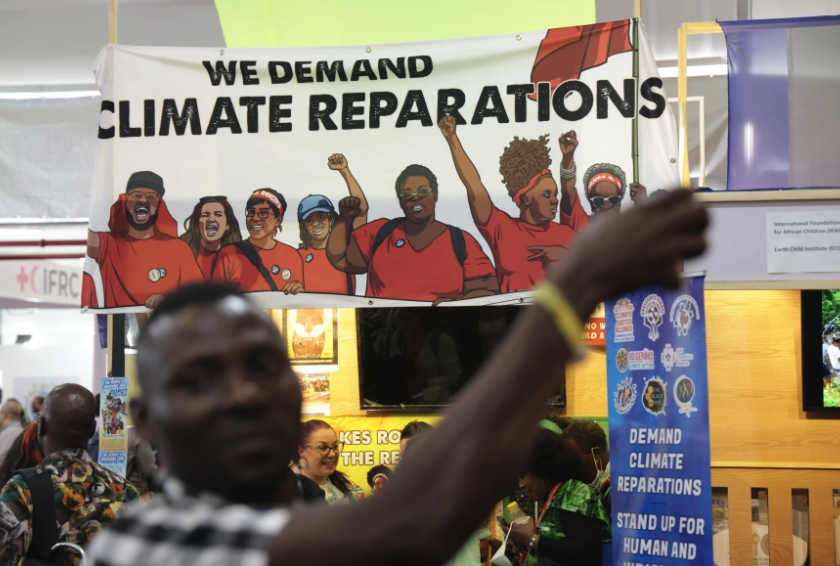
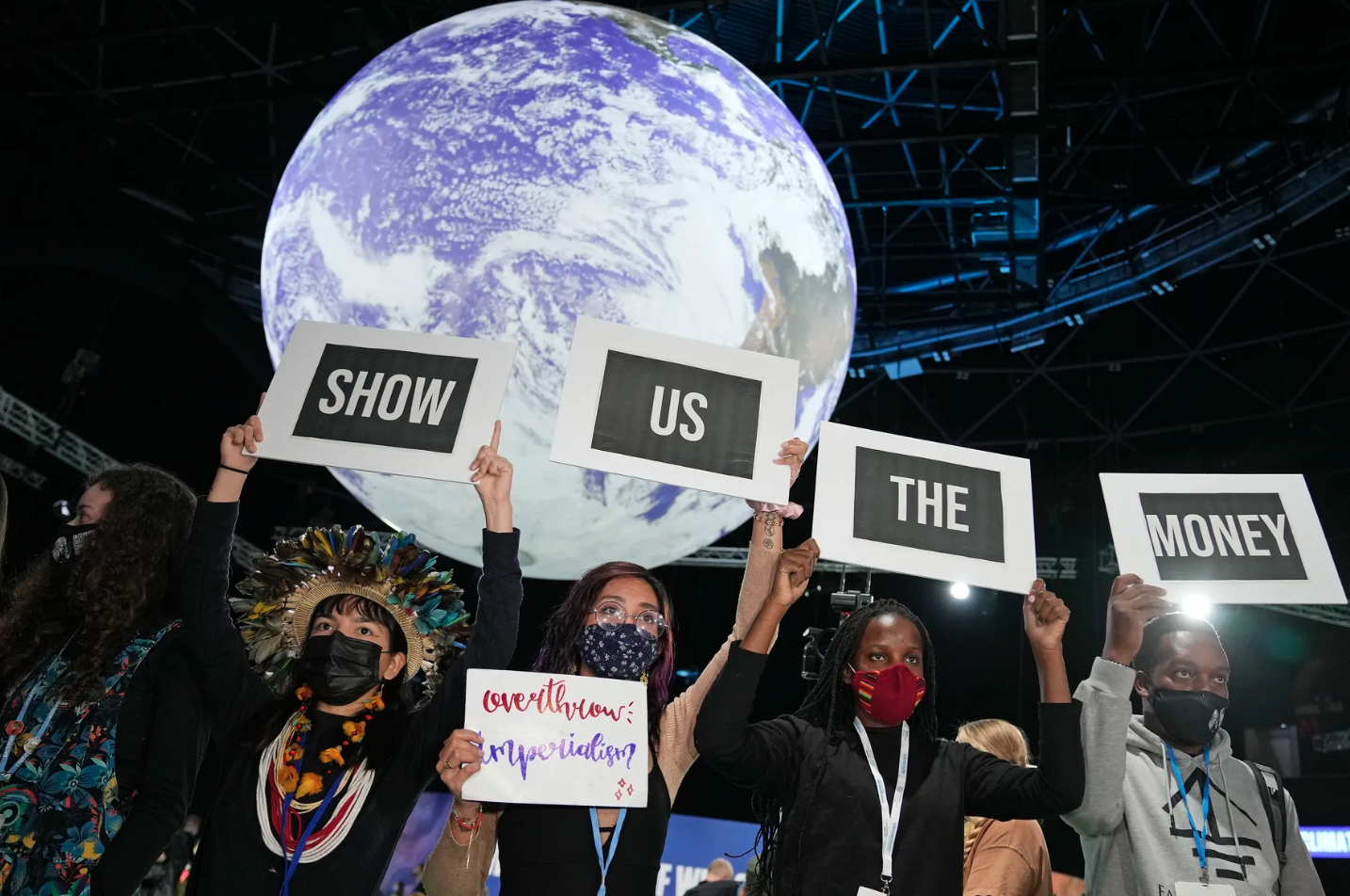
1) Biden’s astronomical pledge: US willing to pay climate reparations if China ponies up too
Politico, 5 November 2022
2) China outmanoeuvres gullible West, ‘willing to contribute’ to climate loss and damage compensation
The Independent, 9 November 2022
3) UN report: Global South needs $2.4 trillion a year to fight climate change
Aljazeera, 8 November 2022
4) Eco warriors demand UK pays up to £1 TRILLION in damages for its role in climate change
Daily Mail, 7 November 2022
5) Daniel Johnson: It’s insane to demand we pay for the ‘sin’ of our industrial past
Daily Mail, 8 November 2022
6) Japan shelves carbon tax as energy prices soar
Nikkei Asia, 8 November 2022
7) ‘We’re not in a climate crisis’: David Frost joins think tank that disputes global heating
The Independent, 9 November 2022
8) UK branded one of the most “fiscally unstable” countries in which to do business
Financial Times, 7 November 2022
9) Industry body slams UK-US LNG deal following fracking snub
City A.M. 9 November 2022
10) Yoweri K. Museveni: Europe’s failure to meet its climate goals should not be Africa’s problem
Newsweek, 7 November 2022
1) Biden’s astronomical pledge: US willing to pay climate reparations if China ponies up too
Politico, 5 November 2022
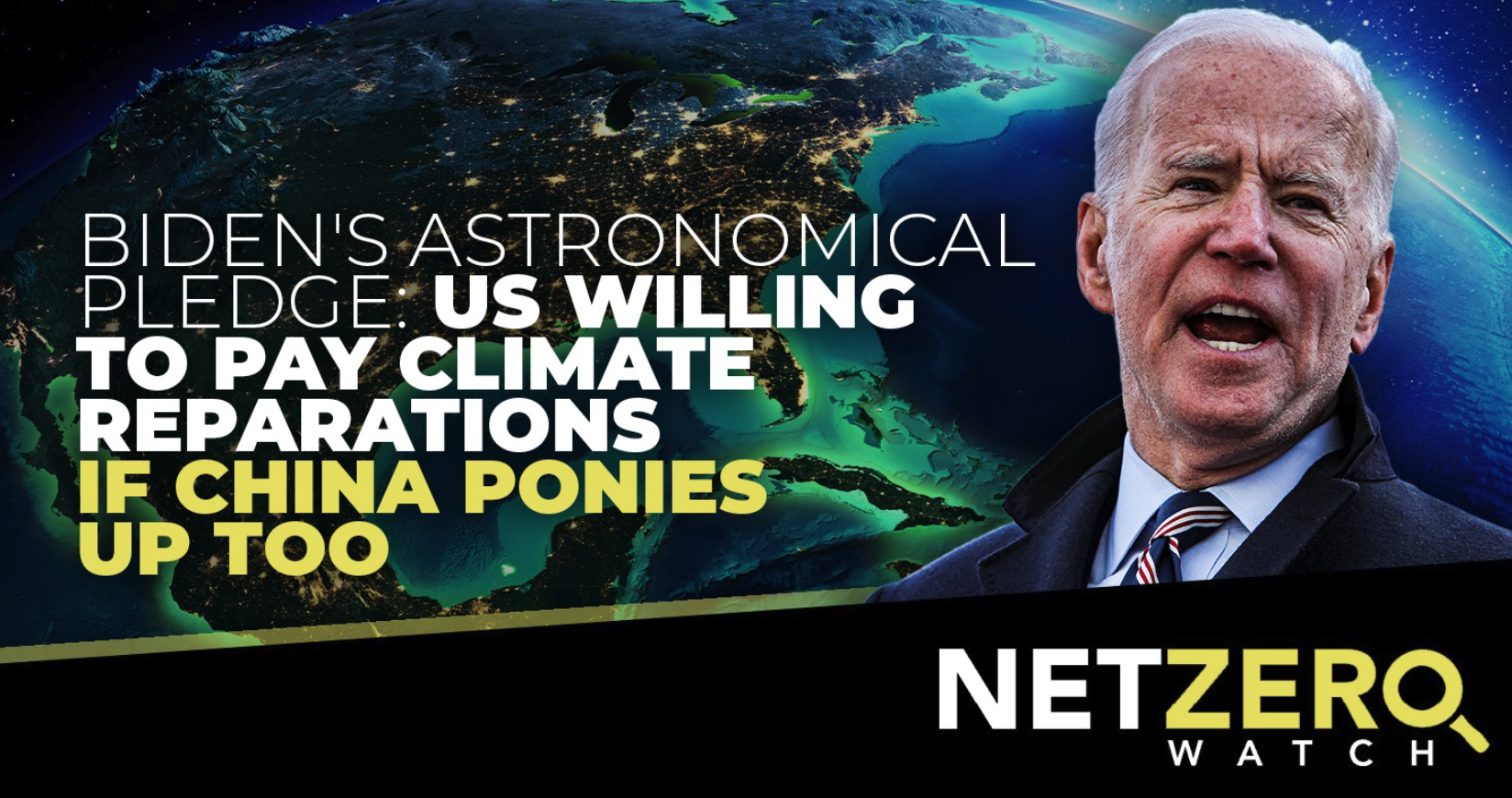
The U.S. is suddenly open to making rich nations pay reparations to countries suffering the ravages of climate change — but only if China ponies up, too.
The about-face comes after years of Washington serving as the bulwark of wealthy countries’ resistance to making such payments, and would set up China as the new climate bogeyman. It would also challenge Beijing’s assertion that China should still be seen as a developing nation.
Paying developing nations that suffer from climate-driven disasters and rising temperatures is one of the most contentious issues in global climate negotiations, which resume this weekend at a major conference in Sharm El-Sheikh, Egypt.
China should contribute its own funds to the cause, U.S. Special Envoy John Kerry told reporters late last month, “especially if they think they’re going to continue to go on to the next 30 years with increasing their emissions.”
The issue, referred to as “loss and damage” in the parlance of the global talks, calls for the U.S. and Europe’s industrialized nations to send funding to less-developed countries that have suffered from floods, heatwaves, droughts, rising seas and other disasters worsened by the changing climate.
Those nations have contributed little to the crisis — in contrast to the United States, which during the past two centuries has pumped more greenhouse gases into the atmosphere than any other country.
The U.S. is now the world’s second-largest current climate polluter. China ranks as No. 1, with carbon emissions more than double those of the U.S.
2) China outmanoeuvres gullible West, ‘willing to contribute’ to climate loss and damage compensation
The Independent, 9 November 2022
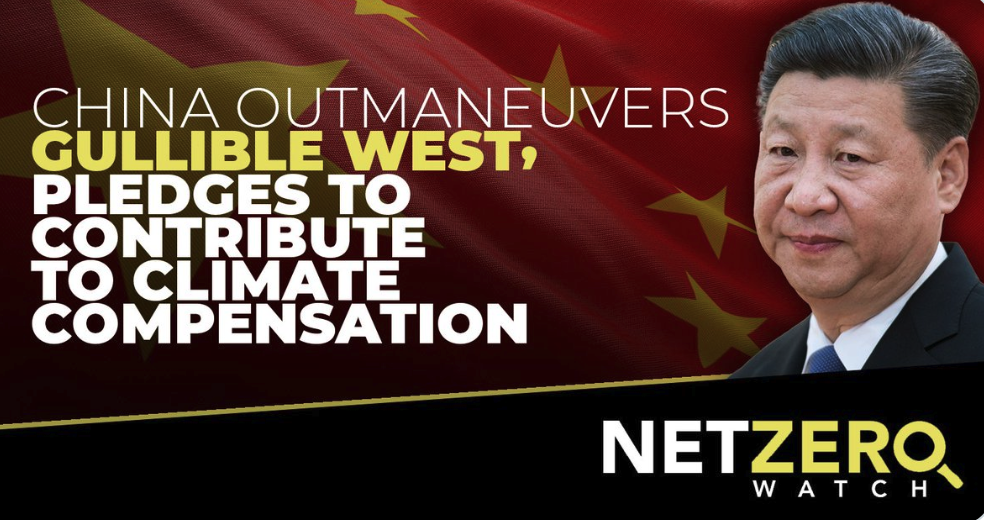
China’s representative at the UN’s Cop27 summit in Egypt has opened the door for a new financial mechanism which could mean the country contributes to climate loss and damage compensation for poorer countries.
The country’s climate envoy Xie Zhenhua said on Wednesday stressed his solidarity with those calling for more action from wealthy nations on the issue, and also spoke about the impacts China had suffered from climate-linked weather extremes. The country has seen record droughts over the summer, but has also had extreme flooding earlier in the year.
Outside the conference centre on Wednesday morning, protesters are also demanding climate compensation and an end to fossil fuel use as negotiations on how to tackle the climate crisis get underway on the summit’s Finance Day.
It comes after the prime minister of Antigua and Barbuda, who is also the chair for Alliance of Small Island States (AOSIS), on Tuesday called for all major emitters to agree to pay for ‘loss and damage’ in the negotiations.
“We all know that India and China … are major polluters and the polluters must pay,” PM Gaston Browne said. “I don’t think that there’s any free pass for any country.”
3) UN report: Global South needs $2.4 trillion a year to fight climate change
Aljazeera, 8 November 2022
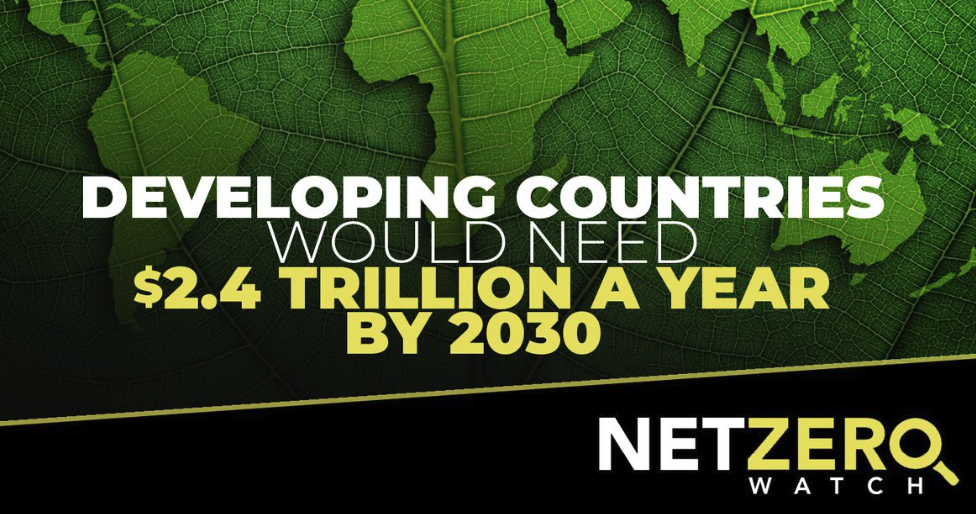
A trillion dollars of that should come from rich countries, investors and multilateral development banks, UN-backed report says.
Developing and emerging countries excluding China need investments well beyond $2 trillion annually by 2030 if the world is to stop the global warming juggernaut and cope with its effects, according to a United Nations-backed report.
A trillion dollars should come from rich countries, investors and multilateral development banks, said the analysis commissioned by Britain and Egypt, hosts respectively of the 2021 UN climate summit in Glasgow and this week’s COP27 event in Sharm el-Sheikh.
The rest of the money – about $1.4 trillion – must originate domestically from private and public sources, the report released on Tuesday said.
Current investments in emerging and developing economies other than China stand at about $500bn.
“The world needs a breakthrough and a new roadmap on climate finance that can mobilise the $1 trillion in external finance that will be needed by 2030 for emerging markets and developing countries (EMDC) other than China,” the report said.
The new 100-page analysis, Finance for Climate Action, is presented as an investment blueprint for greening the global economy quickly enough to meet Paris climate treaty goals of capping the rise in global temperatures below two degrees Celsius, and at 1.5C, if possible.
Warming beyond that threshold, scientists warn, could push Earth towards an unliveable hothouse state.
The report is among the first to map out the investment needed across the three broad areas covered in UN climate talks: reduction of the greenhouse gas emissions that drive warming (mitigation), adapting to future climate effects (adaptation), and compensating poor and vulnerable nations for unavoidable damages already incurred, known as “loss and damage”.
One of the report leads Vera Songwe said “unlocking substantial climate finance was key” to solving development challenges today.
“This means countries must have access to affordable, sustainable low-cost financing from the multilateral development banks to help crowd in investments from the private sector and philanthropy to support the energy transformation, build resilience and protect natural capital,” she said in a press release.
“Financing alone is not enough and must be coupled with the right instruments and good policies to accelerate and scale up impact.”
4) Eco warriors demand UK pays up to £1 TRILLION in damages for its role in climate change
Daily Mail, 7 November 2022
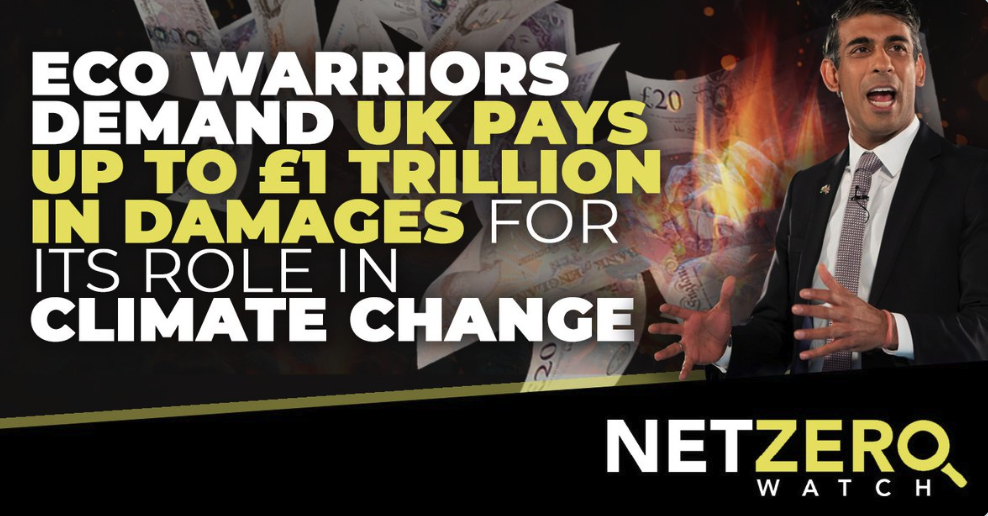
Britain should pay a staggering £1trillion in reparations to developing countries hit by climate change, campaigners claimed tonight.
The demands came as the UN climate conference, Cop27, got under way in Egypt amid warnings the world is on a ‘highway to climate hell with our foot on the accelerator’.
Rishi Sunak echoed the late Queen’s words in his address to the Sharm El-Sheikh gathering this evening, as the Prime Minister reflected on the achievements of the UK’s hosting of last year’s Cop26 conference in Glasgow.
In his first speech to an international summit as PM, Mr Sunak reminded world leaders of Her Majesty’s address to that summit 12 months ago….
In a short speech, Mr Sunak also pledged the UK would triple its funding to help nations adapt to the impacts of climate change as he noted how ‘finances are tough’ both in Britain and across the world.
Mr Sunak insisted it was ‘morally right to honour our promises’ when faced with extreme events such as recent devastating flooding in Pakistan.
The PM also promised £65million investment in a range of green projects in Kenya and host nation Egypt. And he insisted Russia’s invasion of Ukraine was a reason to ‘act faster’ on climate issues as ‘climate security goes hand in hand with energy security’.
But Mr Sunak was also facing a storm tonight over discussions about ‘loss and damage’ – compensation payments to countries suffering the impacts of climate change – which are on the summit’s agenda for the first time.
Amid the demands by campaigners for Britain to stump up an astonishing £1trillion, former PM Boris Johnson said the UK simply ‘could not afford’ to hand over such vast sums – while another MP said paying any reparations was ‘complete and utter madness’.
Full story
5) Daniel Johnson: It’s insane to demand we pay for the ‘sin’ of our industrial past
Daily Mail, 8 November 2022
Of the many benefits that Britain has brought humanity, perhaps the greatest of all is the Industrial Revolution.
So Ed Miliband thinks Britain has a ‘historical responsibility’ to pay climate reparations to the developing world. Why?
Because the Industrial Revolution happened here first, Mr Miliband argues, British taxpayers should subsidise other countries to atone for the climate sins of the past.
What kind of topsy-turvy world does the shadow secretary of state for climate change and net zero inhabit?
Those countries demanding reparations include some of the most cruel, corrupt and dangerous regimes on earth, and are led by Xi Jinping’s China which, besides its oppression of its own people, is by far the world’s worst polluter.
While the UK has been straining every sinew to reduce its carbon footprint, the Chinese have tripled their CO2 emissions in just two decades, now producing more than the whole developed world put together.
And since 1850, China has been responsible for 11 per cent of man-made greenhouse gases released into the atmosphere, nearly four times as much as the UK’s 3 per cent.
Pakistan, singled out by Mr Miliband, has indeed suffered terribly from floods in recent months. Britain has been notably generous in providing both emergency aid and development projects there. But Pakistan is also a nuclear power with a space programme. Should we be subsidising its arms race with India?
Talking of India, the country has seen its CO2 emissions quadruple since 1990, making it the third-largest producer of greenhouse gases on the planet.
Even as we prepare to beggar ourselves by adhering to economically punishing net-zero targets, should we now also accede to India’s demands for reparations, despite its economic success? Intellectually it would be utterly idiotic.
Why, in any case, should Britain apologise for dragging the rest of the world out of the abject poverty in which it had lived since time immemorial?
Of the many benefits that Britain has brought humanity, perhaps the greatest of all is the Industrial Revolution.
Until new British technologies arising from coal and steam made possible the rapid rise in prosperity from around 1800, practically everyone lived in what would now be considered extreme poverty.
For the first time in history, new industries created enough wealth to bring a sustained increase in living standards and life expectancy. Britain led the way, but other nations soon followed and over the last two centuries technological progress has lifted entire nations out of poverty.
Between 1800 and the present day, average global life expectancy has risen from 29 to 71. Thanks to the transformation pioneered by British scientists and entrepreneurs, billions of people now enjoy levels of health that even kings could once only dream of.
The notion that industrial development and economic growth are crimes against humanity, for which reparations are owed by the country that led the way, is the exact reverse of the truth.
And yet, the Left’s obsession with blaming Britain for historical injustices, real or imagined, knows no limits.
The campaigning charity War On Want has come up with the (suspiciously round) figure of £1 trillion — and that only covers what we supposedly owe in climate reparations. How on Earth have they come to that absurd figure?
Even if there were any merit in the case for reparations, such vast sums in any case would be completely unaffordable. The UK’s GDP in 2021 was just under £2.2 trillion. So War On Want is expecting taxpayers to pay half of their entire incomes to satisfy the Left’s implacable desire to redistribute wealth.
Yet the instinctive cringe that afflicts British politicians when they are confronted with these grotesque demands is not limited to the Labour Party. Yesterday Grant Shapps, the Business Secretary, squirmed when he was asked on LBC about climate reparations.
‘We industrialised first and without knowing about releasing carbon from fossil [fuels, we] of course contributed towards it,’ he said. True, Mr Shapps stopped short of Mr Miliband’s blank cheque. Ominously, though, he was ‘supportive of discussions’ about reparations.
Full post
6) Japan shelves carbon tax as energy prices soar
Nikkei Asia, 8 November 2022

TOKYO — Japan will put the introduction of a carbon emissions surcharge on hold, abandoning plans to include it in fiscal 2023 tax reform as it seeks to avoid adding to the burden on companies and consumers already struggling with skyrocketing energy costs.
The government and ruling party lawmakers will look elsewhere to finance the nation’s transition to net-zero greenhouse gas emissions for the time being.
Japan is planning to issue green transformation bonds that would raise around 20 trillion yen ($136 billion), with a carbon-pricing program slated to cover the debt-servicing costs.
“We need to conclude the debate by the end of the year on the green transformation bonds,” Finance Minister Shunichi Suzuki has said. The government seeks to submit a bill needed to issue green bonds to the parliamentary session convening in January.
There are three proposed options for the carbon-pricing scheme: a surcharge imposed on electricity bills, an emissions-trading market and a carbon tax.
But Prime Minister Fumio Kishida did not touch on the carbon tax when discussing carbon pricing at a meeting in October. “We’ll combine the surcharge and the emissions-trading market” to finance the bond offering, Kishida said.
Japan already imposes an extra global warming tax on petroleum and coal. Redefining this levy as a carbon tax would be a complex process that involves setting the amount of new funds to be collected, specifying how the revenue will be allocated, and clarifying definitions.
The carbon tax would have to be part of the new omnibus tax reform bill for fiscal 2023, which starts this coming April. But besides Kishida, the ruling parties, which must sign off on the omnibus bill before it goes forward, remain reluctant.
“Raising taxes that will immediately increase the burden will not be an option,” a source from the ruling coalition said. Energy prices have soared in Japan on Russia’s invasion of Ukraine and the weak yen.
For the time being, the government will consider imposing an electricity surcharge to fund the bonds. Japan currently collects a feed-in tariff surcharge to promote the growth of the renewable energy industry.
A surcharge can be more easily adjusted than an outright tax. But this scheme could introduce fluctuations in values. The emissions-trading market is still in the trial phase.
The shelving of the carbon tax could undercut the incentive for corporations to limit their consumption of fossil fuels. This decision may open Japan to criticisms from Europe, which is embracing the tax to combat climate change.
7) ‘We’re not in a climate crisis’: David Frost joins think tank that disputes global heating
The Independent, 9 November 2022

Global Warming Policy Foundation provides ‘objective view’, ex-Brexit minister argues
Former Brexit minister David Frost has joined a controversial thinktank that denies global heating is a problem, declaring: “We’re not in a climate emergency.”
The Global Warming Policy Foundation – founded by ex-Conservative chancellor Nigel Lawson – has faced calls for it to be stripped of charitable status because of its policy stance.
But Lord Frost, a key figure on the Tory right, said the organisation provided an “objective view” of climate change, as he also suggested the drive for net zero is unachievable.
“One of the things we most need is open debate, full and frank debate,” the former Boris Johnson ally told the TV station GB News.
“The GWPF has been very good at promoting that, over a decade and more, given an objective view of what is going on – and I very much want to be a part of that.”
The backbencher also called for fracking to go ahead, after Rishi Sunak reimposed a ban, and said Liz Truss and Kwasi Kwarteng “should have stuck to their guns” instead of U-turning on the disaster mini-budget.
“In my view we’re not in a climate emergency or a climate crisis in the very hysterical way some people want to suggest, Lord Frost said.
The comments come amid criticism of Rishi Sunak for a “vacuum of leadership” over climate change, as his claim to be “at the forefront” of global efforts to avert disaster was ridiculed.
The prime minister initially refused to attend the Cop27 summit and the UK was criticised for being among 165 countries that have failed to beef-up promises to cut greenhouse gas emissions.
Mr Sunak has also sent Alok Sharma, the respected Cop26 president, into exile, sacking from both his cabinet and his government.
The Global Warming Policy Foundation was launched in 2009 by Lord Lawson, who has called global heating a “non-existent problem” and “quasi-religious hysteria, based on ignorance”.
In the interview, Lord Frost said: “We do have a problem. And the way to tackle that is to adapt and to be serious about the kind of energy supplies we are trying to develop.
“But my worry is that we’re rushing this, trying to do too much too quickly – the technologies aren’t yet available and we’re running into problems.”
He pointed to the Ukraine war and added: “We are facing the prospects of, at least, severe strain on our energy supplies this winter.
“People are focusing on what really matters – which isn’t just carbon emissions, but will the lights stay on, do we have security of supply, and can we afford our energy?”
8) UK branded one of the most “fiscally unstable” countries in which to do business
Financial Times, 7 November 2022
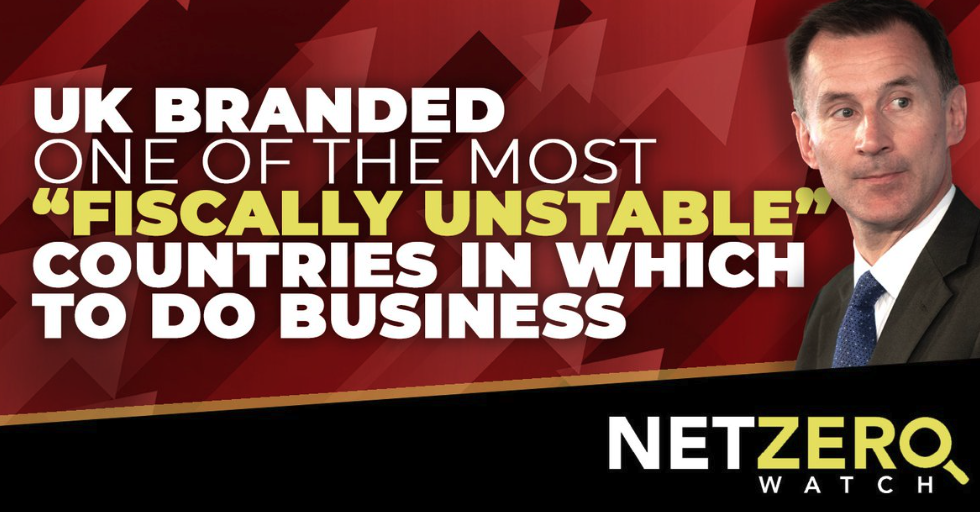
Oil and gas producers have branded the UK one of the most “fiscally unstable” regimes in which to do business, as chancellor Jeremy Hunt examines a further increase in windfall taxes on fossil fuel companies.
In a letter seen by the Financial Times, an industry group representing 20 British oil and gas companies — including top-10 producers Harbour Energy, Ithaca Energy and Neo Energy — told Hunt that higher windfall taxes would put at risk the sector’s “appetite and financial ability” to invest in new projects.
Hunt is assessing a five percentage point increase in the energy profits levy (EPL) to 30 per cent as he seeks to find up to £54bn of savings ahead of the Autumn Statement on November 17.
The EPL was introduced by then chancellor Rishi Sunak in May this year, raising the oil and gas sector’s headline rate of tax to 65 per cent from 40 per cent. The levy is due to expire at the end of 2025, but Hunt is also looking at extending it until 2028.
In its letter, the Association of British Independent Exploration Companies (Brindex) said the EPL had “already created long-lasting fiscal uncertainty and elevated the UK to one of the most fiscally unstable and complex regimes to do business in”.
“Yet another change to the tax regime, in just a matter of months, would be disastrous to the sector,” Robin Allan, Brindex’s chair, wrote, adding that uncertainty about what would be announced on November 17 was “helping drive investment out of the UK”.
A number of western governments, including the US and in Europe, have threatened or announced higher taxes on oil and gas producers, which have reported bumper profits on the back of a surge in commodity prices following Russia’s invasion of Ukraine.
But the UK government is in a difficult position: it is simultaneously asking oil and gas groups to boost production in the North Sea to bolster domestic energy security, and faces a backlash from some of those groups as it weighs uprating and extending the EPL after just six months.
Full story
9) Industry body slams UK-US LNG deal following fracking snub
City A.M. 9 November 2022

The UK’s leading onshore energy body has hammered the Government’s decision to chase a long-term liquefied natural gas (LNG) deal with the US, while re-imposing a moratorium on fracking.
Charles McAllister, director of policy, government and public affairs at UK Onshore Oil and Gas (UKOOG) blasted what he saw as the hypocrisy of Downing Street’s reported decision to take LNG supplies that originated from US shale sites, while effectively banning the process in the UK.
He told City A.M.: “This decision shows that the UK Government supports fracking as a technology, as long as it doesn’t take place in the UK. There is no justification for the UK onshore oil and gas industry to face such hypocritical treatment.”
The policy director also criticised the increased reliance on LNG, with its higher carbon footprint and costs, alongside the growing reliance on overseas vendors compared to domestically procured gas.
He noted that LNG is around four times as carbon intensive as UK shale, making it considerably less appealing than domestic supplies as the country scrambles to meet net zero carbon emissions targets over the next three decades.
McAllister said: “Imported shale gas does not offer the evident economic, geopolitical or environmental advantages offered by exploiting our own natural gas.”
Following Russia’s invasion of Ukraine and a Kremlin-backed squeeze on gas flows into Europe, the UK has turned its focus to boosting domestic energy supplies.
This includes ambitious targets for offshore wind, solar power, nuclear and hydrogen.
However, the new Government has no plans to revive fracking, with Prime Minister Rishi Sunak repealing former leader Liz Truss’ decision to scrap the moratorium – which had been in place since 2019 amid concerns over tremors.
Instead of domestic fracking, the Government is chasing a long-term LNG deal with the US – as first reported by The Telegraph – which could provide 10bn cubic meters of gas.
The deal could be announced within the coming weeks, following the conclusion of the COP 27 climate summit in Egypt.
Full story
Newsweek, 7 November 2022
News from Europe that a vast windfarm is being demolished to make way for a new open-pit coal mine is the reprehensible double standard we in Africa have come to expect.
As Europeans switch their coal-fired plants back on while still demanding fossil-fuel generation remains beyond the pale for Africans. It makes a mockery of Western commitments to climate targets and their promises to help speed African development all in one breath.
We are told that these are only temporary measures, needed to mitigate the energy shortages caused by the war in Ukraine. As soon as the conflict ends, the race to a renewable future will recommence.
In Africa, we believe what we see, not what we hear.
We see hundreds of millions of our own citizens without access to electricity. We see climate-compulsive Western investment in African energy funneled into wind and solar that creates intermittent electricity and not the consistent baseload generation required to power factories or produce employment. We see Europeans with jobs made possible by diverse means of electricity production, and Africans with neither, forcing tens of thousands to make life-threatening crossings of the Mediterranean Sea to Europe.
For some years we have been told fossil fuel investment in Africa for Africans is unacceptable. More recently, through a multi-Western country agreement, a moratorium has even become legally binding. Now with Europe reinvesting in its own fossil fuel power industry to bring mothballed power plants back online, in a truly perverse twist we are told new Western investment in African fossil fuels is possible—but only for oil and gas resources that will be piped and shipped to Europe. This is the purest hypocrisy.
We will not accept one rule for them and another rule for us. We will not allow African progress to be the victim of Europe’s failure to meet its own climate goals. It is morally bankrupt for Europeans to expect to take Africa’s fossil fuels for their own energy production but refuse to countenance African use of those same fuels for theirs.
When decisions like these are being made, and without a shred of self-awareness or honor, it is no surprise some of my counterparts call for reparations or handouts. But this is the last thing Africans need or most want. Dialing down the brazen double-standards is what we desire, along with the lifting of the moratorium on fossil fuel investments for Africa herself so we can meet the needs of our own people.
With this head-spinning pietism, neither should it surprise when Africans look elsewhere for investment that comes without lectures attached. The surfeit of Chinese energy investment in Africa in recent decades can be seen through this prism. More recent arrivals, including the Turks and Indians, are helping build the infrastructure Africans need to raise their continent out of poverty and onto the world stage. Even our old friend the United Kingdom —shorn these days it seems due to Brexit of some of the pretension that still seeps from their near neighbors—is taking a more “enlightenment” approach.
If Africa was to increase electricity production just by using her known reserves of natural gas, the continent’s share of global emissions would rise from 3 percent to just 3.5 percent. Instead, Western money has poured into wind and solar projects that receive applause from the virtuous in the corridors of Congress and the chancelleries of Europe—but leave Africans without electricity when the wind does not blow, and the sun does not shine.
Africa needs to diversify, not restrict its methods of energy production. For every wind or solar array, we need continuous baseload power produced by thermal, mini-hydro, natural gas, and in time, also nuclear. Even the International Energy Agency (IEA), recently in lock-step with Europe’s African fossil fuels investment moratorium, has changed its tune—now calling for Africa to be empowered to use gas and other hydrocarbons for industrialization.
$25 billion per year—less than was spent in six months this year on Western arms to the Ukraine conflict—would, according to IEA estimates, raise 600 million people out of energy poverty by 2030 through such diversification. Africa could repay this with the proceeds from energy investments, and it would be possible to employ and grow millions out of poverty. If Europe still will not help, then we will get there through our own endeavors and with the support of the willing who do not sermonize.
Europe’s failure to meet its climate goals should not be Africa’s problem. But that continent’s determination to write one set of rules for Europeans and a different set for Africans makes it so. It means Europe is complicit in forcing poverty on Africa, and that is not acceptable and will not stand. Should no climate agreement be signed at COP 27 in Egypt this week, we should all recognize who is responsible.
Yoweri K. Museveni is president of Uganda.

